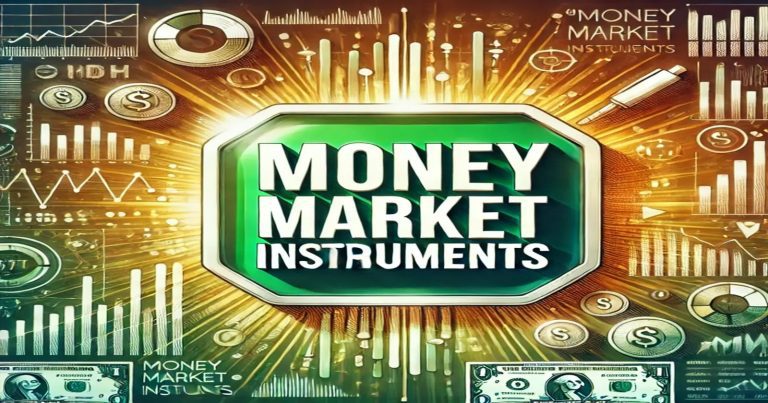Money market instruments are short-term financial tools applied by business organizations, governments, and financial institutions to manage liquidity and raise funds for periods from overnight to one year. Such instruments are critical for maintaining the smooth operation of the economy because they ensure sufficient cash flow in the financial system. They are considered a highly liquid and low-risk investment vehicle that attracts individual and institutional investors.
Money market instruments are necessary short-term financial instruments that offer liquidity and funding opportunities to businesses, governments, and financial institutions.
What are Money Market Instruments?
Money market instruments are short-term debt securities or financial products that may allow the provision of short-term borrowing and lending for a short period, which is usually up to one year. Money market instruments help manage a business’s short-term financing needs and save investors’ funds in a safe and liquid manner. Some money market instruments include treasury bills, commercial papers, certificates of deposit, and repurchase agreements.
These instruments function in the money market, explicitly meant for short-term transaction activities. One segment that does the heavy job of enabling liquidity in an economy and permitting instant cash to meet the requirements of all the borrowers involved. At the same time, the given investment channel serves the cause for the returns-generating purpose.
Objectives of Money Market Instrument
Money market instruments help serve many essential purposes that aid the achievement of financial stability as well as economic growth. There are the following outlined explanations of some of the main objectives:
Providing Liquidity
The foremost function of money market instruments is to ensure liquidity in the financial system. They help supply organizations and governments with short-term financing that enables them to meet urgent financial obligations and thus avoid liquidity shortages.
Short Term Financing
These instruments help organizations manage their working capital requirements. For example, businesses can use commercial papers to raise funds for short-term operational needs.
Interest Rate Management
Thus, the central banks and other similar institutes try to maintain the interest rate by issuing and trading money market instruments.
Economic Stability
Money market instruments facilitate effective funding allocation and liquidity, ensuring stability in the economy. They also help avoid any dislocations of cash flows within industries.
Features of Money Market Instruments
Money market instruments have features that distinguish them from other financial products. Knowledge of these features is essential to both investors and borrowers.
- Short Maturity Period: Money market instruments usually last for a maturity period between one day and one year. The short maturity period provides rapid liquidity with little risk from the market.
- High Liquidity: These instruments are very liquid, which means that they can be converted into cash quickly. This feature makes them the best for short-term financial management.
- Low Risk: Because these instruments have short durations and the issuers are generally credible, money market instruments have a low credit risk. For example, treasury bills are issued by the government and are, hence, highly secure.
- Discounted Issuance: Most of the money market instruments, like treasury bills, are issued at a discount. The investor makes returns in terms of receiving face value at maturity.
- Large Denomination: These instruments are traded in large denominations and are best suited for institutional investors like banks, mutual funds, and corporations.
- No Secondary Market for Some Instruments: Some money market instruments, like commercial papers, do not have an active secondary market, which limits their traceability.
| Feature | Explanation |
| Maturity Period | Ranges from 1 day to 1 year |
| Liquidity | Easily converted into cash |
| Risk | Low due to short-term nature |
| Issuance | Often issued at a discount |
Types of Money Market Instruments
There are many money market instruments, each specially designed to meet the diverse needs of borrowers and investors. Here are a few of the most common types:
- Treasury Bills (T-Bills): Treasury bills are those securities that the government issues with a maturity period of 91 days, 182 days, or 364 days. They are quoted at a discount and are repackaged at face value without any risk component for the investor. T-bills are considered the safest of all money market instruments.
- Commercial Papers (CPs): Commercial papers are unsecured short-term promissory notes issued by corporations to meet their working capital needs. They typically have a maturity period of up to 270 days and are issued at a discount.
- Certificates of Deposit (CDs): Certificates of deposit are time deposits issued by banks with fixed maturity dates and interest rates. CDs are suitable for investors seeking a safe and predictable return on their investment.
- Repurchase Agreements (Repos): Repos are short-term agreements whereby a party sells securities to another party with a promise to repurchase on a specific date at a predetermined price. Repos allow the financial institutions to borrow in the short term.
- Banker’s Acceptance (BA): A banker’s acceptance is a short-term credit instrument issued by a company and accepted by a bank. It is an instrument that is frequently used as a medium of settlement in international trade transactions.
- Call Money: In the money market, call money refers to a short-period loan for one day, whereby one bank gives a loan to another bank. It is an integral part of the interbank money market.
Things to Consider Before You Invest in Money Market Instruments
Investing in money market instruments can be a smart choice for individuals and institutions looking for safe and liquid investments. However, there are several factors to consider before investing:
- Risk Tolerance: These instruments might be low on risk, yet not risk-proof. Consider whether the issuer carries good credit with the marketplace before investing in it.
- Liquidity Needs: The money market is a highly liquid instrument, but restrictions on early withdrawal would be present in most of the available money market instruments.
- Interest Rates: Interest rates determine the return on money market instruments. Keep track of interest rate trends while making investment decisions.
- Issuer Credibility: Select products issued from credible sources. For example, zero credit risk will emanate from the government through treasury bills compared to commercial paper originating from corporations.
How Do Money Market Instruments Impact the Economy?
Money market instruments are the primary tools in maintaining economic stability and growth. Below are some of the key ways through which they affect the economy:
Liquidity Management
Money market instruments ensure that the financial system is liquid enough through short-term borrowing and lending. This ensures that businesses and governments are able to pay their obligations on time.
Interest Rate Regulation
Central banks use the money market instruments to control the short-term interest rate. For instance, the issuance of treasury bills or repo operations can be used to control inflation and monetary policy.
Promoting Savings and Investments
Money market instruments help to offer safe and liquid investments to save and invest for individuals and institutions. This helps build up capital and aid in economic development.
Money Market Instruments FAQs
What are money market instruments?
Money market instruments are short-term debt securities used for borrowing and lending up to one year. Examples include treasury bills, commercial papers, and certificates of deposit.
What are the different money market instruments?
The most common types of money market instruments include treasury bills, commercial papers, certificates of deposit, repurchase agreements, and banker’s acceptances.
What is the difference between money market and capital market instruments?
Money market instruments are for short-term financing needs (up to one year), while capital market instruments cater to long-term investment needs.
Are money market instruments risk-free?
Money market instruments carry minimal risk but are not entirely risk-free. Government-issued securities, such as treasury bills, are the safest.
How do money market instruments operate in India?
In India, money market instruments are traded in regulated markets such as the Reserve Bank of India. Examples include treasury bills, call money, and commercial papers.


